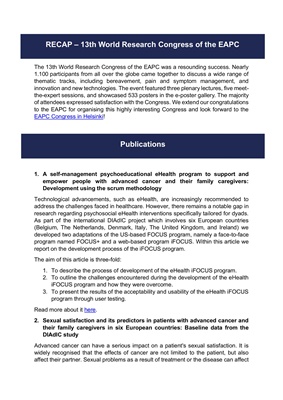
The 13th World Research Congress of the EAPC was a resounding success. Nearly
1.100 participants from all over the globe came together to discuss a wide range of
thematic tracks, including bereavement, pain and symptom management, and
innovation and new technologies. The event featured three plenary lectures, five meetthe-expert
sessions, and showcased 533 posters in the e-poster gallery. The majority
of attendees expressed satisfaction with the Congress. We extend our congratulations
to the EAPC for organising this highly interesting Congress and look forward to the
EAPC Congress in Helsinki!
1. A self-management psychoeducational eHealth program to support and
empower people with advanced cancer and their family caregivers:
Development using the scrum methodology
Technological advancements, such as eHealth, are increasingly recommended to
address the challenges faced in healthcare. However, there remains a notable gap in
research regarding psychosocial eHealth interventions specifically tailored for dyads.
As part of the international DIAdIC project which involves six European countries
(Belgium, The Netherlands, Denmark, Italy, The United Kingdom, and Ireland) we
developed two adaptations of the US-based FOCUS program, namely a face-to-face
program named FOCUS+ and a web-based program iFOCUS. Within this article we
report on the development process of the iFOCUS program.
The aim of this article is three-fold:
1. To describe the process of development of the eHealth iFOCUS program.
2. To outline the challenges encountered during the development of the eHealth
iFOCUS program and how they were overcome.
3. To present the results of the acceptability and usability of the eHealth iFOCUS
program through user testing.
Read more about it here.
2. Sexual satisfaction and its predictors in patients with advanced cancer and
their family caregivers in six European countries: Baseline data from the
DIAdIC study
Advanced cancer can have a serious impact on a patient's sexual satisfaction. It is
widely recognised that the effects of cancer are not limited to the patient, but also
affect their partner. Sexual problems as a result of treatment or the disease can affect
RECAP - 13th World Research Congress of the EAPC
Publications